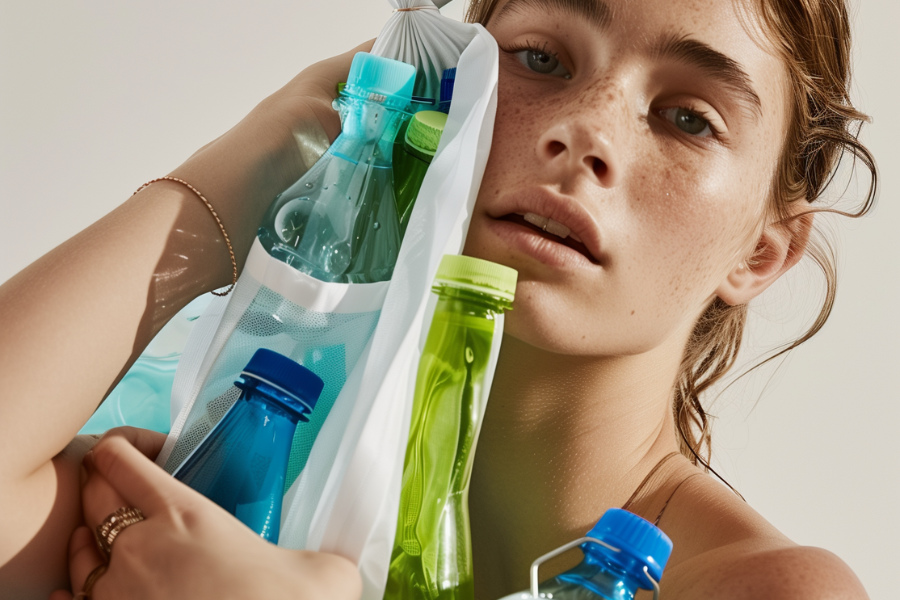Listen up, skincare lovers – it’s time to give your beauty routine an environmentally friendly Remake. As a proudly sustainable skincare company, we just couldn’t bring ourselves to compromise even one teeny, tiny bit on our packaging, which is why we’ve taken extra care to devise products that live in 100% post-consumer plastic bottles and biodegradable boxes.
But, with greenwashing on the rise and terminology thrown about left, right, and centre, let’s break it down – what exactly constitutes sustainable packaging?
Our bottles: Post-consumer plastic
All of our products here at Remake are bottled in 100% post-consumer plastic, also known as PCP. So, that means that when you pick up a Remake product, it’s already had a whole other life prior to holding your new skincare faves.
What is post-consumer plastic, and how does it benefit the circular plastic economy?
Post-consumer plastic starts its journey like any other – as regular ol’ plastic, often called ‘virgin plastic’ before it has gone through any kind of reprocessing and given another life. As most of us now know, the manufacturing of new plastics is hugely detrimental to our natural environment for a number of reasons. Plastic production often comes from fracking, which is a hazardous practice that pollutes our air and waterways by releasing methane, which in turn, disrupts our climate, accelerating the effects of climate change. Plus, if it cannot be recycled, single use plastic ends up in landfill, where it could live for hundreds, if not thousands, of years. This will conjure horrific images for many, as plastic in landfill and our oceans is a leading contributor to (particularly marine) animal deaths worldwide.
Post-consumer plastic is an alternative to constantly producing new plastics, and put simply, takes products that have already been used by consumers and reprocesses them so they can be used again. Often, packaging is recycled and used for the same or a similar purpose. The use of PCPs lessens the impact of plastics on the environment by creating a circular plastic economy wherein materials are used in a ‘closed loop’ system, essentially following a use-recycle-reuse trajectory, rather than the traditional take-make-waste model that is characteristic of single use plastics.
A key component of making this model work is ensuring that when new plastics are created, whether that’s by skincare brands or other businesses in a broad range of sectors, is that they are designed to be recyclable from the outset. This enables the creation of PCP and prevents waste from ending up in landfill.
Why Remake chose 100% PCP
At Remake, our ethos is one of minimal impact for high reward – something that extends to both our ultra-effective yet simple skincare, and our packaging and sustainability efforts. When we set out to create a minimal, no-fuss skincare brand that would help you glow from the inside out, we knew we couldn’t do it in good conscience whilst having a significant environmental impact. Right from the get-go, it was crucial that we did our part to look after our world, and 100% recycled plastics in a closed loop system quickly rose to the top as the best packaging solution for our bottles.
Our boxes: Bamboo and sugarcane pulp
We’ve talked at length about what goes on inside Remake boxes, but what about the external packaging that helps our little glow-getters safely get from A to B – of course, whilst looking fabulous? Yep, we’re talking about our boxes. Just like with our bottles, we knew using recycled material to minimise our impact on the environment was the way to go, which is why we chose a compostable packaging option made from all-natural bamboo and sugarcane pulp (‘bagasse’).
How and why is sugarcane pulp turned into cardboard?
Scrutiny of the production of paper and cardboard is only a recent-ish development, because on the surface, these materials seem inherently sustainable. After all, paper and cardboard are recyclable, and break down easily when left in landfill. However, the actual process of creating paper and cardboard is far from environmentally friendly – tens of millions of hectares of forest are burned or cut down each and every year to account for 420 million tonnes of paper and cardboard production in that same time period. So, it’s no wonder that brands looking to leave Mother Nature well enough alone are seeking alternative packaging materials.
One recycled material that has emerged on top is bagasse, which is a sturdy, compostable, and easy-to-use byproduct of growing sugarcane. Up until recently, when brands at the forefront of sustainability harnessed bagasse to create recyclable packaging, it served no purpose and was left to rot and break down.
To create the outer packaging for a Remake product, sugarcane pulp is blended with bamboo to create bagasse that can be easily moulded into the shape of our boxes – without using any cardboard or harming any trees. Bagasse is 100% compostable and will break down of its own accord, which means it won’t last long in landfill. When you’ve unpackaged and used your product, your Remake box can go in the regular bin, as it’s composed of plant-based fibres and will decompose in the same way that food items do.
Remake’s lifelong commitment to sustainability
Our packaging is just one part of the Remake sustainability story, one that we hold close to our core as a company. As well as our recyclable and reusable packaging, we’ve committed to an environment-first approach by using fully biodegradable or recycled packaging to ship all of our orders, as well as carbon-neutral shipping processes to ensure our carbon footprint stays low. Remake products are also 100% vegan and cruelty-free, and we never – ever – test on animals. Shop the Remake range now and explore a self-care routine that’s better for your skin and for the planet.


